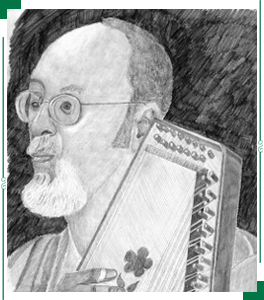
Bob likes a wide variety of musical styles, so this CD contains quite an eclectic collection. There’s a classical piano piece, an orchestral overture, and three brass band marches. There are folk tunes from the 1800’s and today, a rock and roll standard, and a tune Bob wrote himself. There are country, Celtic, and Broadway show tunes. They’re not all instrumentals, and two don’t even feature an autoharp! The unifying thread is that Bob enjoys playing them all, and he hopes you enjoy them too.

When you tell people that you play the autoharp, they expect you to do “Carter songs.” Well, here’s Lynda and Bob’s “Carter” song—David Carter’s remarkably beautiful ballad with Biblical and ecological themes. Bob plays this on the baritone autoharp—a tribute to the late Gordon Baker who built the instrument.

This instrumental was inspired by the Frank Sutcliffe photograph of an Irish fisher girl. It’s been recorded by a number of autoharp players. Bob hopes you like his version.

Lynda and Bob learned this song quite a while ago at an MLAG workshop at the Orthey farm. It certainly does evoke the feeling of an outdoor music festival.

Bob wouldn’t have considered this rock and roll classic from Led Zeppelin as an autoharp solo until he heard Dolly Parton’s version done as a “country” song.

This was one of Bob’s favorite songs from his college years. He used the technique of playing the diatonic D lock bar on his Orthey diatonic autoharp as “just another chord” during this piece.

Bob thinks of this tune often when he's preparing for an autoharp competition. You always need to strive to be better than before – in life as well as in music.

Thanks to Ivan Stiles and Karla Armstrong, who gave Bob copies of their autoharp arrangements for this piece. Bob’s version has wandered a bit since then, especially since he has to use substitute chords in some places. His chromatic autoharp doesn’t have any diminished seventh chords.

Ivan Stiles played this piece in the finals of the 2006 MLAG championship. He blew the crowd and the judges away! Ivan helped Bob to learn this at MLAG in 2007. It’s a real “crowd-pleaser.” It’s also the “National March” of the USA.

It took Bob nearly 6 months to learn this one! The originally written autoharp arrangement was by Ivan Stiles; he also got help from Karla Armstrong. Any mistakes in the final arrangement on this CD are his own.

Bob first really heard this rousing march played by a brass band at a Fourth of July celebration at the Mt. Washington Hotel in Bretton Woods, New Hampshire. Glenn Miller popularized this piece in the 1940s. Something in the back of Bob’s mind suggested that it might sound good on the autoharp. It is certainly fun to play.

Why would a Yankee from Boston want to play “Dixie”? The tune’s composer, Dan Emmett, was born in Ohio, where Bob grew up. The piece was premiered in New York City, where Bob was born. Strangely, despite its association with the Confederacy, Dixie was a favorite tune of Abraham Lincoln and was played at his inauguration. Bob’s version was inspired by Harvey Reid’s playing of it on his “Autoharp CD.”

This piece is quite a workout for the chromatic autoharp player. Besides, Bob has fond memories of its association with the old “Lone Ranger” radio shows. “Return with us now to those thrilling days of yester-year…a cloud of dust and a hearty Heigh-o Silver….” Bob’s arrangement began when he first heard Pam Roberts play this on an autoharp many years ago.

This tune is a salute to Bob’s Polish ancestry and to the inspiration of his pianist friend Marjan Kiepura’s recording of the piece as it’s supposed to be played! Bob is actually playing it in Bb to get a fuller sound on some of the chords. Two-key diatonic autoharps always involve some compromises.

This medley of three Celtic tunes was first inspired when Bob got Karen Mueller’s “Celtic Autoharp” book. He starts off with the Irish tune “Sheebeg Sheemore,” then the Welsh tune “All Through the Night” (Ar Hyd y Nos), and finishes with the Scottish tune “Scotland the Brave.” Interestingly, although the tune of “Scotland the Brave” is traditional, the “standard” words to it were actually written by the Scottish journalist Cliff Hanley in the 1950s.

This was the “last song” at nearly every show at the ARK coffeehouse in Ann Arbor, Michigan, while Bob was an undergraduate student there. It holds many fond memories for him.
Over 50 Years in the Autoharp Music Community
©2021 GrappelCohen rights reserved. Website by web.com